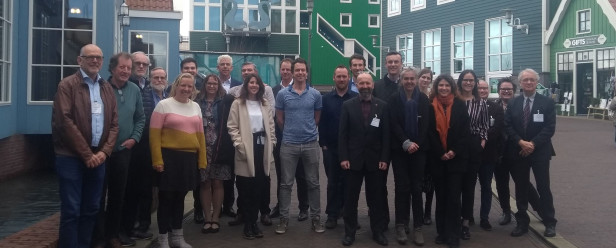The project aims to demonstrate and accelerate the empowerment of citizens to become active energy citizens - and to create local energy communities via existing civil society structures - through development of new solutions (e.g. organisational) and adoption of new, emerging and existing solutions for energy ownership.
EMPOWER2.0

What is the goal of the project?
The challenge:
In many cities and regions there are initiatives in which citizens are encouraged to actively participate yet scaling up towards the point where this effort can have a significant impact is the most challenging. Another important factor is that initiatives aimed at (individual) citizens usually attract a certain type of citizen: the relatively affluent, intrinsically motivated, and green oriented citizen. To have a significant impact on the degree of renewable energy we need to engage with not just the frontrunners, but the masses. Our shared territorial challenge is therefore to empower citizens, local stakeholders through existing civil society structures to engage majorities of citizens in the energy transition.
The objective:
The overall project objective is to demonstrate and accelerate the empowerment of citizens to become active energy citizens - and to create local energy communities via existing civil society structures - through development of new solutions (e.g. organisational) and adoption of new, emerging and existing solutions for energy ownership. This will lead to an increase of energy awareness and renewable energy production, and hence reduce the environmental footprint in the NSR. We want to see thousands of local energy cooperatives, not in replacement of the large international few, but in addition to them. If (groups of) citizen and businesses generate, store and trade their energy and can choose when and from whom they buy, then they become empowered.
The approach:
Analysis of the specific challenges (governance, technical, legal) for setting up local energy communities through existing trusted networks;
Development of optimal methodologies per region, focused upon the challenges of that region;
Testing of the methodologies in 7 living labs in different NSR countries with, on average, 2000 households per pilot project;
Development of a transnational toolkit in the form of an online platform that showcases all arrangements and possibilities for other interested local authorities.
What is the result of the project?
Pilot projects through the NSR will be run that use opportunities to organize direct access to the energy market by engaging and connecting existing civil society structures, such as schools, sports clubs, neighborhoods, business parks or local energy cooperatives. 14000 households in the directly involved municipalities and regions of the partners will be empowered, leading to an increased uptake of renewable energy by 1% of the households in the NSR and a reduction of 28000 carbon dioxide emissions in the North Sea Region.
Who initiated the project and which organizations are involved?
EMPOWER2.0 is an Interreg North Sea Region funded project with 15 partners:
7 cities/provinces/intermuncipality organisations (Gemeente Zaanstad (NL), Provincie West-Vlaanderen (BE), Essex County Council (UK), Southend on Sea Borough Council (UK), Middelfart Kommune (DK), Gemeente Haarlem (NL), Intercommunale Leiedal (BE))
3 universities (Hogeschool van Amsterdam (NL), University of Southern Denmark (DK), Ghent University (BE))
1 company (Graham Oakes Ltd (UK))
3 cooperatives (Coöperatieve WeSpark Zaanstreek (NL), Stadsgarage (NL), Coöperatie Kennemer Energie (NL)).
What is the next step?
The project started in March 2019 and it will run until December 2021. The partners now started to run the first pilots’ experiments and the toolkit prototype is about to get tested with different stakeholders.
What can other cities learn from your project?
Local solutions ask for local tailoring, but models and lessons learned can be transferred beyond the local boundaries. This is possible through the combination of our local tailor-made solutions and the generic toolkit. The developed tools are to be transferable and replicable across urban authorities. The toolbox is the result of the living lab experimentation in EMPOWER2.0, and showcases the lessons learned in involving target groups in the energy transitions barriers. The toolbox will be presented to the participants of the living labs, co-designed with stakeholders, test it with new interested parties and target groups - their feedback will be used for improvement.





Hi Robin,
Thanks for your input! I didn't know the project, it is indeed embedded in the Amsterdam Smart City platform. There is not yet any connection established but I had the chance to come across interesting project deliverables:
https://cordis.europa.eu/project/rcn/191724/reporting/en
http://livinglabs-ghent.fi-week.eu/files/2010/12/1110-Ballon-01.pdf
Our project just started and we are still in the defining phase (especially regarding the toolkit) but I envision this toolkit as a set of methods, tools and processes that enable citizens to become prosumers, very similar to some of the protocols developed by APOLLON, so thanks a lot for sharing!!
The project reminds me of the APOLLON project in which I participated in 2011 through my graduation internship at Alliander, also having to do with Living Labs around energy efficiency. This was also facilitated partly from within Amsterdam Smart City I believe. Other participants were from Lulea in Sweden and Helsinki in Finland amongst others. Is there any connection?